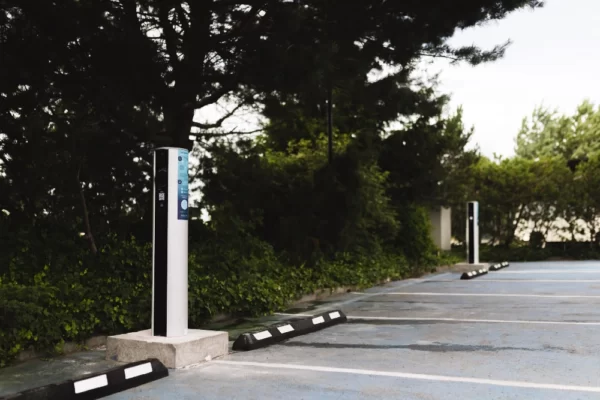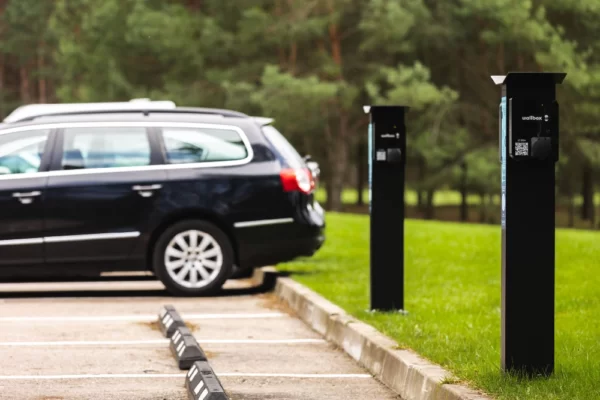Business
We are expanding electric car charging network in Lithuania. Suggest a location for the charhing points!
Where are the charging stations applied?

In real estate projects

In company car parks

In public spaces

In multi-apartment buildings
(for associations and administrators)

Other
What are the benefits?

No worries about charging equipment – we install and maintain it.

No need to increase
power.

Potential additional income from charging infrastructure.

Comfort for employees, customers and everyone who uses an EV.
Most popular services
We are flexible and can offer a variety of charging solutions to suit your individual needs.
Įkrautas invests
Free charging equipment
Free installation work
- Charging points are taxed for all users.
- Free equipment administration.
- Equipment service and warranty for the entire duration of the contract.
- The profits generated are shared by agreement.
The client invests
Charging equipment costs
Installation costs
-
- Charging points for selected users.
- Fixed equipment administration fee.
- Profits generated are shared.
-
- Tax-free charging points for consumers.
- There is no equipment administration fee.
- No profit is generated.
The client rents
Free charging equipment
Free installation work
- Free charging for your internal use, for external users stations are charged.
- There is no equipment administration fee.
- Equipment service and warranty for the entire duration of the contract.
- Monthly rent.
- Generating profit for the customer.
A smart network of charging stations
As more charging stations are deployed, we offer a smart solution to manage them.
Both the homestead and the site’s electricity grid are managed by an interent platform.
The stations communicate with a web-based platform.

Charging stations are located in parking spaces.



The stations and the electricity grid are remotely controlled.
A smart network of charging stations
As more charging stations are deployed, we offer a smart solution to manage them.
Both the electricity grid at the farm and the site is managed through an interactive platform.

1
Charging stations are located in parking spaces.

2
The stations communicate with a web-based platform (back-end).

The platform allows remote control of stations and the electricity grid.
3

Smart charging network managed by an online platform
Why do you need it?
- Automated on-site power grid management
- Charging points configuration
- User administration
- Pricing settings
- Management of accounts, reports.
Charging equipment
We work with trusted and well-known global manufacturers in the field of electrical engineering, so we can offer you quality equipment that meets your needs.


- Power (kW): 2×22
- Connector (Type2): Socket
- Chargeable: Yes
- Dynamic power control: Yes
- Metering: Yes (free for the first 2 years)


- Power (kW): 11 / 22
- Connector (Type2): socket
- Taxable: yes
- Dynamic power control: yes
- Accounting: yes (free)


- Power (kW): 2×22
- Connector (Type2): socket
- Taxable: yes
- Dynamic power control: yes
- Accounting: yes


- Power (kW): 2×22
- Connector (Type2): socket
- Taxable: yes
- Dynamic power control: yes
- Accounting: yes


- Power (kW): 2×22
- Connector (Type2): socket
- Taxable: yes
- Dynamic power control: yes
- Accounting: yes


- Power (kW): 3,7-22
- Connector (Type2): socket / cable (5 m)
- Taxable: No
- Dynamic power control: yes
- Accounting: no


- Power (kW): 7,4 / 11 / 22
- Connector (Type2): socket / cable (5 m)
- Taxable: yes
- Dynamic power control: yes
- Accounting: yes


- Power (kW): 2×22
- Connector (Type2): socket / cable (5 m)
- Taxable: yes
- Dynamic power control: yes
- Accounting: yes (free for the first 2 years)


- Power (kW): 11
- Connector (Type2): socket / cable (5 m)
- Taxable: yes
- Dynamic power control: yes
- Accounting: yes


- Power (kW): 7,4 / 11 / 22
- Connector (Type2): socket / cable (5 m)
- Taxable: yes
- Dynamic power control: yes
- Dynamic power control: yes


- Power (kW): 2×22
- Connector (Type2): socket / cable (5 m)
- Taxable: yes
- Dynamic power control: yes
- Accounting: yes (free for the first 2 years)


- Power (kW): 22
- Connector (Type2): socket / cable (5 m)
- Taxable: yes
- Dynamic power control: yes
- Accounting: yes


- Power (kW): 24 (DC)
- Connector type (CCS2 + CHAdeMO; CCS2 + CCS2): Cable 3 m
- Taxable: Yes
- Dynamic power control: No
- Accounting: Yes


- Power (kW): 120/180 (DC)
- Connector (CCS2 / CHAdeMO): Cable 3,9/6 m
- Taxable: Yes
- Dynamic power control: No
- Accounting: Yes


- Power (kW): 50 (DC)
- Connector (CCS2 / CHAdeMO): Kabelis 2.7/4.45 m
- Taxable: Yes
- Dynamic power control: No
- Accounting: Yes


- Power (kW): 50 (DC)
- Connector (CCS2 / CHAdeMO / Type 2): Cable 3,9 m
- Taxable: Yes
- Dynamic power control: No
- Accounting: Yes


- Power (kW): 360 (DC)
- Connector (CCS2 / CHAdeMO / Type 2): Cable 4.7 m (standart)
- Taxable: Yes
- Dynamic power control: No
- Accounting: Yes
You don’t need to know in advance how many and which charging stations are needed at your place/location.
That’s what we are for. Fill in the request form and let’s talk.
Completed projects




Entertainment complex
HBH Palanga
Liepų g. 23, Žibininkai
- 1 (DC) and 2 (AC) charging points.
- Charging stations are publicly accessible to all.
- Charging sessions are carried out using the Charged mobile app.
- Charging sessions are charged.




Official Opel and Peugeot dealer
AUTOVICI
Ukmergės g. 300, Vilnius
Savanorių pr. 404G, Kaunas
- 21 (AC) charging point
- Private charging stations for internal company use.
- Charged with maintaining and administering the charging equipment.


Business Centre
CITY
Žalgirio g. 90, Vilnius
- 6 (AC) charging points
- The charging stations are for business centre staff and customers.
- Charging sessions are charged.
- Charged with maintaining and administering the charging equipment.



Sanatorium
Eglės Sanatorium
Eglės st. 1, Druskininkai
- 4 (AC) charging points
- Public charging stations are available for both spa clients and visitors.
- Charging sessions are charged and take place via the Charged mobile app.

Block of flats
Naujapilis
Žaliakalnis, Kaunas
- 8 (AC) charging points
- The charging stations are located in a gated block of apartment blocks, for residents, and are charged.
- Charging sessions are carried out using the Charged mobile app.




Family clinic
Sveikatos ratas
Sangrūda st. 2, Kaunas
- 2 (AC) charging points
- The charging stations are for clinic staff and clients.
- Charging sessions are charged.
- Charged with maintaining and administering the charging equipment.

Artūras Stoškus






